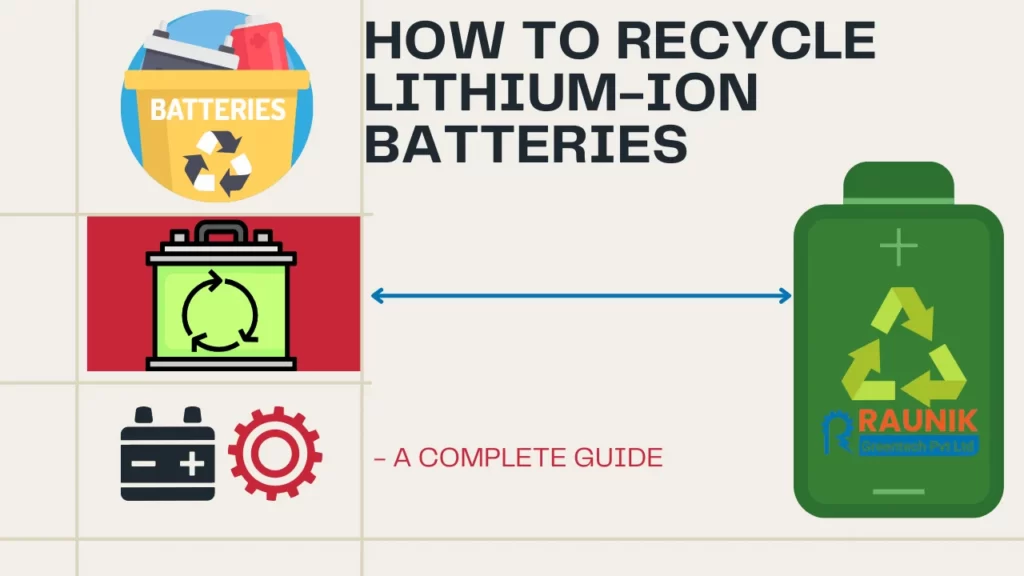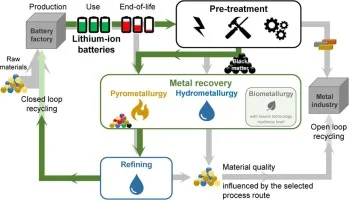
One of the significant problems with lithium-ion batteries is recycling them because now there are a lot of manufacturing units worldwide, and the demand for lithium-ion batteries is increasing daily. But the problem is what to have to do with the old batteries that we are not using, which can cause a big issue, so we should make a proper solution for them.
Suppose the problem is not solved as soon as possible. In that case, it can cause horrible environmental effects, so recycling lithium-ion batteries has become necessary as the lithium-ion battery manufacturing demand is high in the market.
Lithium-ion batteries are made from different transition metal oxides, like aluminium, copper, and graphite. On the other hand, the electrolytes contain many harmful salts, which is why the researcher pays more attention to recycling lithium-ion batteries. you can Also Check How a Lithium Battery Works Or Why is Lithium Used in Batteries
Here is complete information on how to recycle lithium-ion batteries.
Can You Recycle Lithium-Ion Batteries?
Many people have this question in their mind, so the simple answer to this question is yes; no doubt that this process is very complicated and consists of many difficulties, as recycling metals and electrolytes is not easy.
So that’s why finding a recycling plant is not easy, because only a few companies are providing the battery recycling infrastructure. As the lithium-ion batteries are not made from the material that is used in the other batteries, this is why you cannot hold and save the recycling material of the lithium-ion batteries.

Suppose you have a little bit of knowledge about metals. In that case, you know that lithium is a very reactive element, so using lithium-ion batteries for paper recycling is not a good practice. If you increase the heat or electric charge, it can cause a fire inside the lithium-ion batteries, which is harmful to the humans working with these projects, so a highly safe environment is needed for this work.
As the cells are made from electrodes, electrolytes burst into flames, so this is the reason that recycling lithium-ion batteries is an easy job. The recycling process of the lithium-ion batteries is not the same as the other batteries, as you cannot reuse the lithium-ion batteries directly, so recycling is the only solution in which you can reuse the material used in the lithium-ion batteries. In this, you also don’t need to search the lithium from different locations, which is good for the natural environment, as lithium cannot be found freely in the universe.
Maybe you think that if the recycling process is complicated, how is it possible to recycle lithium-ion batteries? To disassemble batteries into modules the qualified technicians need for this job, these people are highly trained and use the insulting tools to prevent themselves from short circuiting and electrocution. Short-circuiting the lithium-ion batteries is not a cup of tea; sometimes, it can cause rapid discharge and overheat, which causes a cell to explode. After separating the different items from the lithium-ion batteries, the expert observe which items can be reused in the batteries or other things because it can save time and recycling costs.
Can You Through Away The Lithium-Ion Batteries?
Many people think that they cannot get through the lithium-ion batteries with their regular trash because lithium-ion batteries contain different items like metals and electrolytes, and these elements are not suitable for our natural environment; as following are the impacts of lithium-ion batteries on our environment.
Lithium-ion batteries also contain some other highly damaging metals when used with lithium. You can check the amount of those metals after breaking down the batteries.
When you use the lithium-ion batteries with the other trash, they can leak cobalt, nickel, and manganese, so you can imagine how these metals can change your environment. If you throw away the lithium-ion batteries in the trash, it can cause burn the garbage and even the ground and the other materials in the trash.
Lithium-Ion Battery Recycling Procedure
There are different mechanical hydrometallurgical techniques to recycle lithium-ion batteries. We can recover the cobalt, nickel, manganese, and lithium from the lithium-ion batteries so that we can use these elements in manufacturing other products and new batteries.

As the companies use their techniques for recycling the batteries, here we discuss the low CO2 battery recycling process combined with mechanical and hydrometallurgical technology, which Fortum introduced. This famous recycling company can recycle many materials, including batteries.
Mechanical Processing
First, we must dissemble the lithium-ion batteries in the power plants treated with different elements. This mechanical process can recycle the plastic, as the plastic is also used in lithium-ion batteries, their body holder is always plastic material, the aluminium, copper and the black mass can also be recycled by this process.
The black battery mass consists of many critical metals that are not good for the natural environment. These materials are taken to the hydrometallurgical process so that the essential materials can be separated, and other materials that are recovered again recycled for further reuse.
The fantastic thing about this process is that 80% of batteries can be recycled through this mechanical and hydrometallurgical procedure.
Hydrometallurgical processing
This is a somehow different process from the mechanical procedure, as in this step, the essential materials recovered from the black mass, like the special chemicals, so that they can be used in other projects and batteries. The hydrometallurgical involves the chemical precipitation methodology, and all the materials recovered from the black mass are sent again to the battery manufacturers to use in the batteries.

People are trying to find methods that can give them more benefits at a meagre cost, like most of the battery materials reused in the new batteries, so there is no need to buy expensive materials like metals and electrolytes.
Using the hydrometallurgical method, 95% of the valuable materials can be reused in the new batteries; in this way, you can save a lot of money.
Social and Environmental impacts of Lithium-ion Batteries
We know that the production of lithium-ion batteries is increasing daily, so we need to have more lithium. According to research, for the production of one-ton lithium, we need to mine 250 tons of the ore spodumene or 750 tons of rich brine, so you can imagine how much cost is required for this can make considerable changes to our environment.
One major problem while mining these materials to get the lithium is that they consume a lot of water; in Chile’s Salar de Atacama, 65% of water is only used for mining. This can create a problem for the local farmers using water for their crops. If pollution-free water is unavailable, they must import water from another region by paying a heavy amount.
On the other hand, when this polluted water merges with seawater, it is not useable for crops or animals, and the fish starts to die if they live in the contaminated water. One important thing to keep in mind is that while recycling lithium-ion batteries, the raw material released from the recycling process can pollute the water and the earth.
So that’s why the organization is now working on recycling the lithium-ion batteries at a meagre cost, reducing the production speed of the new lithium-ion batteries. You cannot afford the lithium-ion-used batteries with trash because they can react with debris and cause a fire.
We have to use recycled material to minimize the production of the new lithium-ion batteries.
Benefits Of Recycling The Lithium-Ion Batteries
Many people think that there is no need to recycle batteries. Still, if you ask this question to the battery manufacturers and the environmental experts, they also pay attention to recycling lithium-ion batteries.
Today lithium-ion batteries are the most expensive of all the other types because the materials used in these batteries are tough to find. If they are available, they are comparatively costly.
So we can save a lot of money and natural resources if we utilize tutilizevered material from the recycling process of lithium-ion batteries. Nickel, cobalt, and lithium are costly metals, and they cost half of a fully prepared lithium-ion battery; in this way, we can also save natural resources, and it will decrease the pollution caused by the trash of the lithium-ion batteries.
One significant benefit of recycling lithium-ion batteries is that it can reduce the number of materials that goes to landfills and causes many problems for human animals, and significantly affect the natural environment. It can cause a fire in the dumps that can burn many precious things, and sometimes it can burn the whole forest and kill many lives.
So if we utilize the lithium-ion batteries and use them in the manufacturing of the new lithium-ion batteries, it can reduce the cost and prevent our land from the dangerous chemicals released by the batteries.
Challenges in Recycling Lithium-ion batteries
Many people think that if there are too many benefits to recycling lithium-ion batteries, then why cannot recycle all the used batteries, so the simple answer to the query is that there are many challenges that can stop you from recycling the lithium-ion batteries. Here are some challenges that prevent you from recycling lithium-ion batteries.
The major problem in recycling batteries, people hesitate to install the plants because it can cost a lot of money. The people also have a high demand for useless batteries, as they claim that the elements used in the batteries are costly, so they want to sell their used batteries at high rates.
Another important reason is that people don’t have enough information about the recycling process of lithium-ion batteries; they think that we cannot benefit from the used batteries.
The plants installed for the recycling of lithium-ion batteries also need highly advanced machinery to separate the different metals and liquids, so the Government of every country has to provide the machinery to the people interested in installing these plants.
But only a few Governments are interested in these types of projects, and the others show zero interest in these projects, so the Government has to play an essential role in the development of recycling the used lithium-ion batteries.

